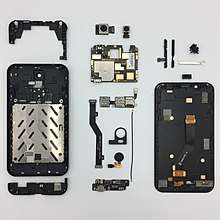Shiftphone
.jpg)
Shiftphone is a modular, easy to repair smartphone created by the company SHIFT in Germany. The company emphasizes fair trade and ecology similar to Fairphone.[1] Instead of coltan, ceramic capacitors are used for their manufacturing. So far, nine model series were released. The last release was Shift6m in May 2018. The upcoming devices will be Shift5me and Shift6mq. [2][3][4][5][6][7][8]
Devices
| name | year of release |
|---|---|
| SHIFT4 | 2015 |
| SHIFT4.2 | 2017 |
| SHIFT5 | 2015 |
| SHIFT5.1 | 2015 |
| SHIFT5.2 | 2016 |
| SHIFT5.3 | 2017 |
| SHIFT5me | expected in December 2018 |
| SHIFT6m | 2018 |
| SHIFT6mq | expected in May 2019 |
| SHIFT7 | 2014 |
| SHIFT7+ | 2016 |
| Shift12m | expected 2019/2020 |
| The names of model series are based on display sizes of the devices. The digit following the dot signifies the model version. For example, SHIFT5 was replaced by an updated SHIFT5.1, followed by SHIFT5.2. In 2017, SHIFT decided to include suffix 'm' in future product names, to highlight the modular nature of their devices. | |
History
SHIFT is developing smartphones and Phablets since 2014. In the beginning Carsten and his brother Samuel Waldeck realized the project SHIFT7 through German crowdfunding platform Startnext. The brothers started Shift GmbH, a company with limited liability by German law. Further Shiftphones were launched with model series SHIFT4 and SHIFT5 in 2015. The project grew into a small company with 15 employees in Germany, which collaborated with the Chinese production coordinator company "Vstar and Weihuaxin" in Shenzhen.[9] Since 2018 the company employs 10 workers in an own manufacturing facility in Hangzhou.[10]
Characteristics

Sustainability:
Shiftphones are built in a modular manner to allow the customer to change parts and repair the device without voiding warranty. Videos support the user in repairing their device, explaining how to open it and how to change certain modules. [11]
Cycle Economy:
Customers have the upgrade option, to upgrade their device to a different model. [12]
In 2016 SHIFT GmbH introduced a device deposit for all SHIFT products. The company claims, that end users can send their devices back to SHIFT and get a refund depending on the devices condition. [11]
The objective of these two methods is, to bring unused devices back to life, or to dispose them properly. Returned Shiftphones are repaired if necessary, and sold second hand.
Workers Care:
Shift employees in China don't work more than 50 hours a week when it is common for people to work up to 90. Compared to the average Chinese worker in production business, staff is provided with insurances. [13]
Controversies about conflict minerals
The company and further secondary sources claim, that Coltan is not in use for their manufacturing.[14] However the journal c't argues, that there was no evidence, that Coltan is not used in Shiftphones. Besides they criticized the transparency of SHIFT. According to c't, the SHIFT partner company "Vstar and Weihuaxin" did not provide information about conflict-free material used in Shiftphone. Unlike Shiftphone, Fairphone provides detailed audit reports about component suppliers through a Chinese agency, and also facilitates detailed information on problems and compromises in the supply-chain.[9] Coltan is used to make components for mobile phones and other electronic devices. A huge part of the ore is won from mines in the DRC (Democratic Republic of Congo). "Much mining has been done in small artisanal mining operations, sometimes known as Artisanal and Small-Scale Mining (ASM). These small-scale mines are unregulated, with high levels of child labor and workplace injury." Approximately around 50.000 children work in Congo's Coltan Mines, some of which are just seven years old. Workers hardly have any protection and often work underground in self-made shafts.[15]
References
- ↑ Schröder, Horst (4 April 2016). "So gut ist das erste Fairphone aus Deutschland". www.gruenderszene.de. Retrieved 5 September 2018.
- ↑ Galan, Ana (24 October 2017). "Shiftphone: an Ethical Smartphone That's Made in Germany - Responsibility". RESET.to. Retrieved 7 September 2018.
- ↑ Hasenheit, Marius (28 September 2015). "ShiftPhone: Das erste faire Telefon aus Deutschland". www.wiwo.de. Retrieved 7 September 2018.
- ↑ "Shiftphone 5.1 – Das kann das faire Smartphone - Bilder & Fotos - WELT".
- ↑ "Shiftphone 5.1: Praxis-Test des fairen Smartphones".
- ↑ Johannsen, Thomas (June 2017). "Oberklasse Shiftphone Shift5.2". Tablet und Smartphone: 11.
- ↑ Knödl, Karsten (August 2017). "Mehr als fair". Heimatnachrichten Fritzlar/Homberg. p. 5.
- ↑ Peters, Rolf-Herbert (November 2015). "Handy mit Moral". Stern: 134.
- 1 2 Wölbert, Christian (September 2016). "Das angeblich faire Android-Smartphone Shift 5.1". c't. pp. 64, 65.
- ↑ Lohr, Matthias (16 June 2018). "Dieses Smartphone aus Nordhessen könnte Ihr Lieblings-Handy werden". www.hna.de. Retrieved 5 September 2018.
- 1 2 Wiebke, Wiebke (March 2018). "Wegweiser in Sachen Fairness". Guter Rat: 55.
- ↑ "Nachhaltigkeit von Geschäftsmodellen in der Informations- und Kommunikationstechnik" (PDF). Deutsche Umwelthilfe: 8, 18. January 2018.
- ↑ Holtkemper, Lennart (March 2017). "Fairphone und Shiftphone: Nachhaltig produzierte Smartphones". Connect.
- ↑ Neubauer, Dr. Uta (December 2017). "Faire Handys aus Hessen" (PDF). Technologieland Hessen. p. 47.
- ↑ Behnke, Andrea (September 2016). "Rohstoffabbau schadet Umwelt und Menschen". Verbraucherzentrale NRW. Retrieved 31 July 2018.